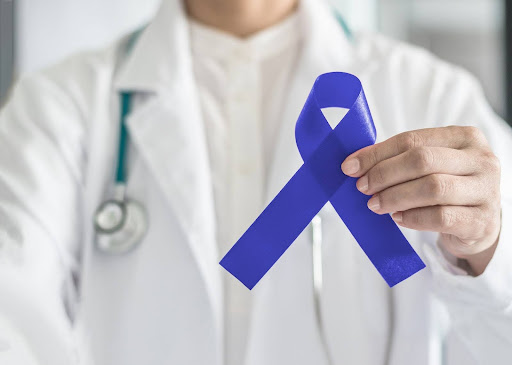Colon Cancer FAQs: Colorectal Cancer Awareness Month

According to the National Cancer Institute, 153,020 people in the U.S. were diagnosed with colon cancer in 2023. Since many cases of colon cancer can be prevented, it’s important to bring awareness to it. In honor of Colorectal Cancer Awareness Month, Birmingham Gastroenterology has compiled this informative list of frequently asked questions.
What is Colorectal Cancer?
Colorectal cancer or colon cancer begins in the colon or rectum. It occurs when normal cells that line the colon grow out of control. The Centers for Disease Control and Prevention states that colon cancer is the fourth most common cancer in men and women as well as the fourth leading cause of cancer deaths in the country.
What are the Signs and Symptoms of Colon Cancer?
Oftentimes, colorectal cancer doesn’t show any symptoms, making it essential to get routine colonoscopies. When colon cancer does become symptomatic, however, it may cause more frequent constipation or diarrhea, rectal bleeding, a feeling that a bowel doesn’t completely empty during a bowel movement, and weakness.
What is a Colonoscopy?
A colonoscopy is a screening exam that looks at the inside of your colon, rectum, and anus with a flexible tube with a camera. It’s performed to detect abnormalities such as colon cancer or polyps, which are small growths. Routine colonoscopies are recommended for men and women who are 45 years old or older.
What is a Virtual Colonoscopy?
A virtual colonoscopy is quicker and less invasive than a traditional colonoscopy. It involves a CT scanner, which takes X-rays of the colon. A computer compiles the X-rays to create 3D images of your colon and rectum so that a doctor can review them. If you have problems with breathing, bleeding, or swelling, a virtual colonoscopy may be a viable option.
What Causes Colon Cancer?
The exact cause of colorectal cancer is unknown. However, there are certain factors that can increase its risk. These include a family history of colorectal cancer, familial adenomatous polyposis (FAP), lynch syndrome, polyps in the colon and rectum, being overweight or obese, smoking, and inflammatory bowel disease (IBD).
Is It Possible to Prevent Colon Cancer?
Yes. Since colon cancer usually begins in benign polyps that develop on the inner lining of the bowel, removing them during a colonoscopy can help prevent colorectal cancer. Removal will ensure that the polyps never grow and become cancerous.
How is Colon Cancer Treated?
Treatment for colorectal cancer usually includes a number of treatments and procedures. These may include polypectomies, colectomies, radiofrequency ablation, chemotherapy, and targeted therapy. The stage of colorectal cancer will typically dictate the treatment protocol that is recommended.
What Can I Do to Reduce My Risk of Colorectal Cancer?
Fortunately, there are a number of lifestyle habits that can help you lower your chances of a colon cancer diagnosis. Several examples include eating a nutritious diet with minimally processed meats and dietary fat, exercising regularly, reducing stress levels, quitting smoking, and maintaining a healthy weight.
Is There Support Available for Those Living with Colon Cancer?
If you or a loved one is living with colorectal cancer, there are a number of resources you might find helpful. These include the Colorectal Cancer Alliance Helpline (877-422-2030), the Colorectal Cancer support group live, and the Blue Hope Nation Facebook group. There may also be local resources in your area.
What are the Stages of Colorectal Cancer?
The five stages of colorectal cancer include:
- Stage 0: Cancer is found in the mucosa, which is the innermost lining of the colon.
- Stage 1: Cancer appears in the first and middle layers of the colon.
- Stage 2: Cancer has grown into all layers of the colon.
- Stage 3: Cancer has spread to nearby lymph nodes.
- Stage 4: Cancer has spread to other organs, away from the colon and rectum, such as the lungs or liver.
Have Questions About Colon Cancer? Contact Us Today
Here at Birmingham Gastroenterology, we have decades of experience treating diseases and disorders, including colon cancer. To make an appointment to discuss your symptoms and treatment options, call us at (205) 271-8000.

